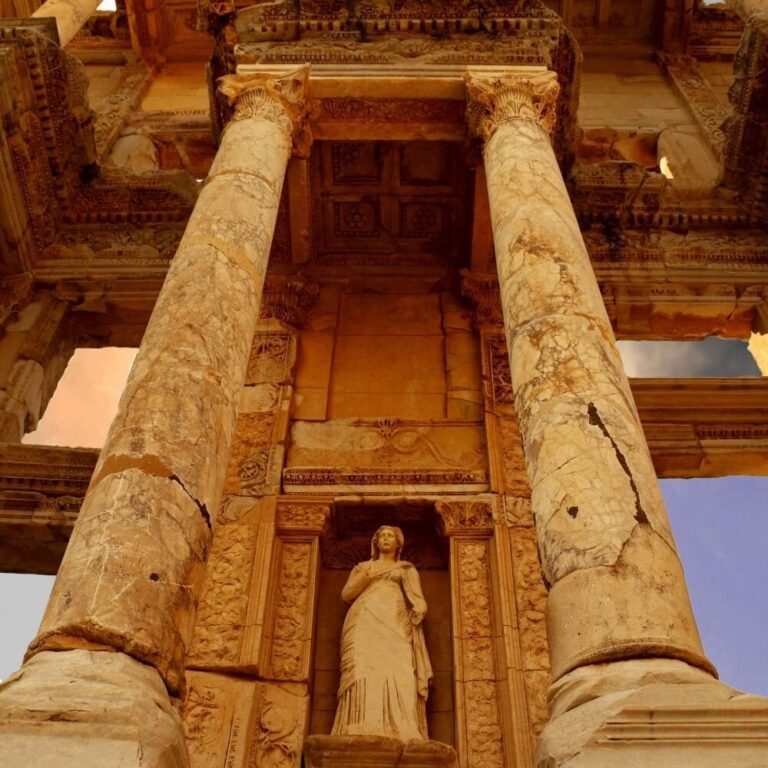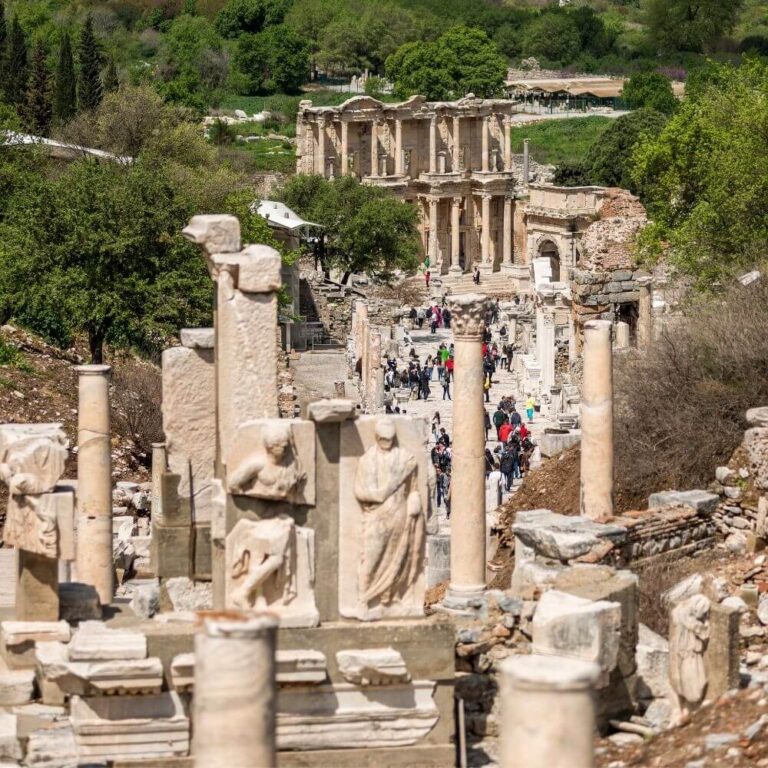Uncover The Untold Secrets Of Ephesus’ Ancient History!

Untold Secrets Of Ephesus' Ancient History!
Uncover the Untold Secrets of Ephesus’ Ancient History! If you’re cirouis about this keep reading , Ephesus is a place you absolutely need to explore. This ancient city in Turkey is brimming with untold secrets and fascinating stories that go beyond the standard tourist routes. Let’s dive into the hidden gems and lesser-known facts that make Ephesus such a remarkable historical treasure.
The Origins Of Ephesus
For uncover the Untold Secrets of Ephesus’ Ancient History first lets look at historical part.
Early Beginnings of Ephesus Ancient City
Ephesus has a history that’s as rich as its ruins are vast. According to legend, the city was founded by the Amazons, a tribe of warrior women. Archaeological digs have revealed early settlements dating back to the 10th century BC, showing that Ephesus has been a significant site for centuries. When I visited, learning about these early beginnings gave me a deep appreciation for the city’s longevity and its role in shaping the ancient world..
Historical Significance
Ephesus wasn’t just any ancient city; it was a major player in Greek and Roman history. As a bustling port and trade hub, it was a melting pot of cultures and ideas. Walking through its streets, you can almost feel the echoes of bustling markets and grandiose temples that once stood as symbols of its economic and cultural importance.
The Temple Of Artemis: More Than Just A Wonder
Architectural Marvel
The Temple of Artemis was one of the Seven Wonders of the Ancient World, and for good reason. The sheer scale and intricate design of the temple were remarkable. I remember standing in the shadow of its ruins, imagining the grandeur of the original structure. Its reconstruction after multiple destructions speaks volumes about its significance to the people of Ephesus.
Cultural Impact
This temple wasn’t just a place of worship; it was a cultural beacon. It influenced religious practices and inspired countless artistic endeavors throughout history. The temple’s impact on art and architecture is still visible today in various modern designs inspired by its grandeur.

The Library Of Celsus: A Beacon Of Knowledge
Architectural Features
The Library of Celsus was not only a repository of knowledge but also an architectural masterpiece. The facade alone is worth a visit. I was struck by the detail in the columns and sculptures, which spoke to the importance of knowledge and learning in ancient Ephesus. Restoration efforts have preserved much of its former glory, making it a must-see for anyone interested in ancient architecture.
Historical Context
The library wasn’t just a place for books; it was a hub of intellectual activity. It housed thousands of scrolls and served as a gathering place for scholars. Imagining the scholars and thinkers who once roamed its halls gave me a deeper understanding of its role in advancing knowledge and education in the ancient world..
The Ephesus Theatre: More Than Just Entertainment
Construction and Design
The Ephesus Theatre is a marvel of ancient engineering. With a capacity of around 25,000 people, it was one of the largest theatres of its time. I was amazed by the theatre’s acoustics, which are still impressive today. Standing in the center of the stage, I could hear every whisper from the audience, a testament to the ingenuity of ancient engineers.
Societal Role
The theatre was more than a place for plays; it was a social and political hub. Public debates, legal proceedings, and entertainment events took place here. Understanding its role in Ephesus’ public life helped me appreciate how central it was to the social fabric of the city..

The Terrace Houses: Private Lives Of Ephesus’ Elite
Discovery and Excavation
The Terrace Houses, often referred to as the “Pompeii of the East,” offer a fascinating glimpse into the lives of Ephesus’ wealthy citizens. These well-preserved homes were uncovered relatively recently, and exploring them felt like stepping into a time capsule. The intricate mosaics and frescoes provided insight into the daily lives and tastes of Ephesus’ elite..
Social Insights
Walking through these homes, I saw how the wealthy lived with luxury and sophistication. The layout of the houses and the artifacts found within them revealed much about social hierarchies and daily activities. It was intriguing to see how the ancient elite entertained themselves and displayed their wealth..
Lesser-Known Sites And Hidden Gems
Subtle Highlights
Beyond the well-known landmarks, Ephesus has a number of hidden gems. For instance, the agora and the cisterns are often overlooked but offer fascinating insights into the city’s infrastructure and daily life. I stumbled upon these sites during a less crowded part of my visit and was pleasantly surprised by their historical significance..
Recent Discoveries
Archaeologists are continually uncovering new aspects of Ephesus. Recent finds, such as new statues and inscriptions, have shed light on different facets of Ephesus’ past. Following the latest discoveries can offer a fresh perspective on the city’s history and ongoing research efforts.
The Influence Of Ephesus On Modern Culture
Historical Impact
Ephesus has left a lasting mark on art and literature. Its ruins have inspired countless artists and writers, from ancient poets to modern novelists. I found it fascinating to see how the city’s history is reflected in various artistic expressions, highlighting its enduring influence on cultural narratives.
Visitor Experience
To truly appreciate Ephesus, take the time to engage with its history. Guided tours and educational resources can enhance your understanding of the city’s rich past. Exploring Ephesus is not just a visual experience; it’s an opportunity to connect with history on a deeper level..




